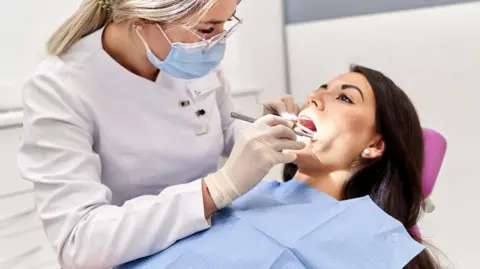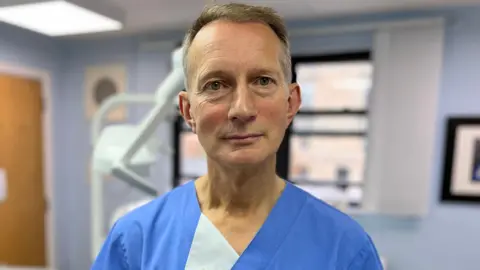 Getty Images
Getty ImagesSix Scottish council areas are “dental deserts” without practices able to take on new adult NHS patients within three months, BBC News research has found.
Just one in four dental practices in Scotland said they were able to offer NHS appointments for new patients during that time.
The British Dental Association in Scotland says patient access issues are now a national problem and many dentists are unable to do NHS work.
The Scottish Government says it recognizes the challenges, particularly in rural areas, but continues to provide financial support to support NHS care.
In August, BBC Scotland News contacted almost 900 dental practices registered on the NHS Inform website to get a picture of the situation.
Of the 717 who responded, 185 offered NHS appointments for adults within three months. While only 26 practices gave appointments in two weeks.
At the time the research was carried out, Argyll & Bute, Dumfries & Galloway, Inverclyde, Orkney, Perth and Kinross and Shetland had no dentists with NHS capacity for new patients, while only one practice in Fife said it was registering NHS patients, with a three-month waiting list .
Three Scottish practices have told BBC Scotland News they are signing up new NHS patients but there are two-year waiting lists for appointments.
And five practices said they have waiting lists of at least a year.
A total of 91 practices listed on the NHS Inform website said they had now gone private.
David McColl, chairman of the Scottish dental practices committee at the BDA, said patient access issues were now widespread with a “two-tier system” developing as many practices focused on private work.
He blamed treatment backlogs from the pandemic, recruitment problems and “inadequate government funding” with further reforms needed to make the NHS a “better place to work” for dentists.
Why is it so hard to find an NHS dentist?
Mr McColl, a dentist in Glasgow alongside the BDA role, said the issue of patient access was now a national issue.
He said: “We’ve always had problems in Dumfries and Galloway when trying to recruit dentists and now we have places like Fife which are almost dental deserts with practices closing.
“I think it’s a widespread problem now – we have Inverclyde now with a problem with practices that are closing NHS patients. It’s certainly a problem in the north of Scotland and Dumfries and Galloway, but I think it’s a widespread problem.
Dentistry in Scotland has always been a mixed economy. As independent contractors, ‘high street’ dentists are paid per treatment for the NHS work they carry out, with patients also charged.
The health board also has public dental services (PDA) for those not registered with street dentists.
But dentists are not obliged to do NHS work and many have private and NHS patients in the same practice, while some choose to be private.
In November last year, the Scottish government agreed a new funding model which increased the fees dentists received. It also saw inspections move from every six months to 12.
The changes have been welcomed by dentists, but the BDA warns there are significant recruitment challenges and without further reform dentists will leave the NHS for more attractive private practice.

Mr McColl said there was now a two-tier system developing in dentistry.
He said: “When it comes to dentistry, patients today want things the NHS can’t deliver – they want teeth whitening, a six-month smile, straight teeth, white crowns and white fillings – these are things the NHS can’t deliver.
“It is up to the government to decide what is in the NHS, and what the NHS can provide and to have an open, transparent discussion with the profession and patients about what the NHS can provide.”
‘I have no money’
In Dumfries and Galloway, health boards are asking the Scottish government for extra funding to tackle shortages.
This has resulted in one practice in Moffat taking on new NHS patients with all spaces now filled.
There is also a move to bring in 12 dental students for outreach facilities.
In Annan, residents described the lack of dental access as a “nightmare”.
William Anderson hasn’t been to the dentist “in years”.
The 76-year-old said: “I think something needs to be done. How much does an appointment cost now and how long does it take?”
Shirley Kirkpatrick did not register when the dentist went private.
“My dentist has gone private and you have to pay first,” he said.
“I had no money so I had to go to a dental hospital in Dumfries.
“I think it’s ridiculous. Annan is a small town but everyone needs a dentist.
David McColl, chairman of the British Dental Association’s Scottish Dental Practice Committee, said the Scottish government had delivered the necessary reforms, “but we have been clear that this cannot be the end of the road”.
He added: “The simple fact is that many patients cannot access NHS care, while practices have vacancies that cannot be filled. They are two sides of the same coin.
“Scotland needs a 21st Century service where dentists will choose to build their careers. Ready to shift focus from treatment to prevention.
A Scottish government spokesman said it was aware that in some areas, particularly in rural areas, access to dental services remained “challenging”.
He said the additional financial support could open up a new operation in Moffat, which could take an extra 2,000 NHS patients.
He added: “Almost a year on from the dental payment reform, NHS dental services are responding well to the changes with the latest figures showing more than one million courses of treatment were delivered to patients in the quarter ending June 2024.”





